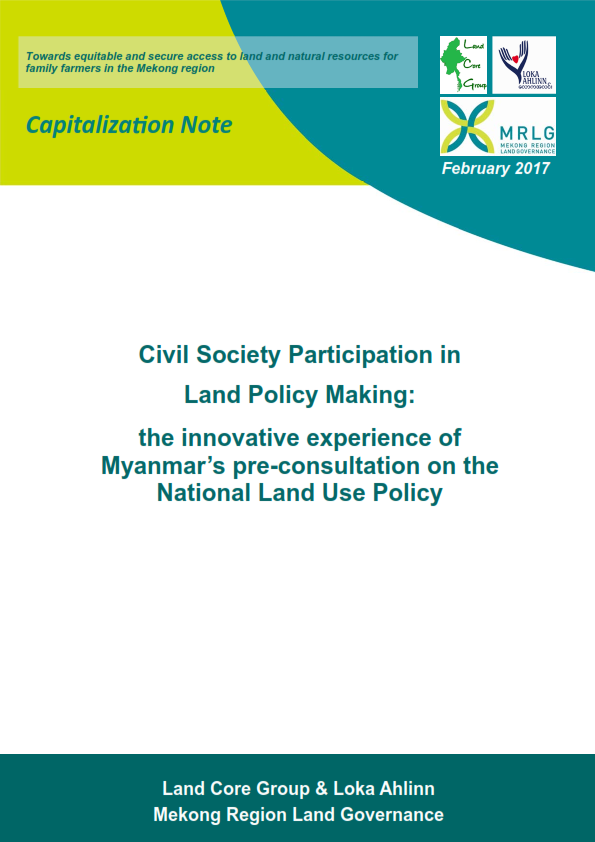Location
Project Description
Land governance is at the center of development challenges in Cambodia, Laos, Myanmar and Vietnam. Governments are revising land policies and practices in order to face these challenges. The project aims to (i) assist the emergence of more favorable policies and practices for securing the rights and access of family farmers to land and natural resources; and (ii) to strengthen the effectiveness of concerned stakeholders through learning, alliance building and regional cooperation.
The MLRG project is based in Laos, with local offices in three other countries: Cambodia, Myanmar, and Vietnam. It supports a wide range of activities (training, exchanges, case studies, focused research, documentation, workshops and seminars) at local, national and regional levels.
The MRLG can support initiatives through three component windows, the first is a learning and advocacy ongoing activity platform supported by National Facilitators in each country. The second two are funded through our Grant Facility open to all stakeholders based on demand and proposals prepared. A short term and immediate response window is the Quick Disbursement Fund (QDF). The second longer term and competitive proposal process is the Innovation Fund (IF). The learning and advocacy activity platform prepared on an annual basis in consultation with stakeholders to organize information collection, analysis, and dissemination, and for horizontal learning and structured learning visits, coaching and pairing, training and organizational strengthening, at the national and regional level.
Members:
Resources
Displaying 56 - 60 of 110Summary Report: Recognition of Customary Tenure in the Mekong Region
This dialogue provided a way for the land community to collaboratively explore challenges and opportunities related to the recognition of indigenous, ethnic minority and customary tenure rights in the Mekong region in order to:
Agro-Business Large Scale Land Acquisition in Myanmar: Current situation and ways forward
This presentation summarizes an on-going research in Myanmar, carried out by renowned agricultural specialist U San Thein and a team of experts, with the support of MRLG. This research is based on a thorough analysis of records on vacant, fallow and virgin land allotted for mainly agri-business projects between 1992 and 2016, and also an analysis of the reports of the Parliamentary Investigation Commission on land confiscation and the return of land. The study also included interview responses from key government staff in all concerned line ministries.
Documenting Customary Tenure in Myanmar: A guidebook (First Edition)
This guidebook provides conceptual, legal and practical tools and resources to help civil society organizations guide communities through the process of documenting customary tenure at the local level. It also provides suggestions for how to build on the momentum generated by the documentation process to develop strategies and actions to defend, strengthen and promote customary rights at community, regional and national level. The guidebook was developed out of practical experience and conversations with local groups in Myanmar that have been documenting customary tenure.
Civil Society Participation in Land Policy Making: the innovative experience of Myanmar’s pre-consultation on the National Land Use Policy
In October 2014, for the first time in recent history, the government of Myanmar decided to organize a public consultation to inform the development of a national policy. To support this consultation process, several organizations decided to organize civil society pre-consultation activities to listen and gather concerns from smallholder farmers to formulate relevant recommendations for the policy dialogue.
Civil Society Participation in Land Policy Making: the innovative experience of Myanmar’s pre-consultation on the National Land Use Policy
In October 2014, for the first time in recent history, the government of Myanmar decided to organize a public consultation to inform the development of a national policy. To support this consultation process, several organizations decided to organize civil society pre-consultation activities to listen and gather concerns from smallholder farmers to formulate relevant recommendations for the policy dialogue.





